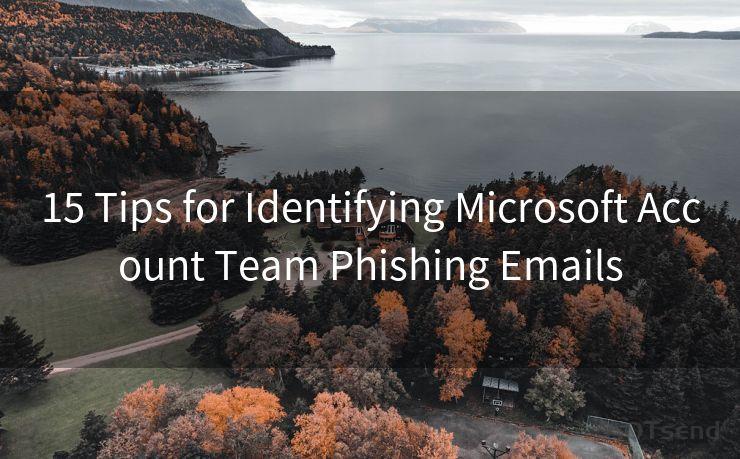15 Tips for Identifying Microsoft Account Team Phishing Emails




In the digital age, phishing emails have become a common tactic used by cybercriminals to steal personal information. Among these, emails claiming to be from the "Microsoft Account Team" are particularly prevalent. To help you stay vigilant and protect your data, here are 15 tips to identify such phishing emails.
1. Check the Sender's Email Address
Always verify the email address of the sender. Microsoft's official emails usually come from well-defined domains like @microsoft.com. Be suspicious of any address that looks similar but is slightly altered.
2. Examine the Email's Greeting
Official emails from Microsoft often use a generic greeting like "Dear Customer" or your actual name if you're a registered user. Phishing emails might use a more personal approach but often contain spelling or grammatical errors.
3. Look for Urgency or Threats
Phishing emails often create a sense of urgency, demanding immediate action to prevent account closure or loss of data. Microsoft will not threaten to close your account if you don't respond immediately.
4. Analyze the Links Provided
Hover over any links in the email to check their destination URL. If the link doesn't lead to a Microsoft domain, it's likely a phishing attempt.
5. Beware of Attachments
Be cautious of emails with attachments, especially if they claim to be from Microsoft. It's safer to access your account directly through the official Microsoft website rather than opening attachments from unknown sources.
6. Verify the Email's Content
Read the email carefully. Phishing emails may contain vague or generic information, while official emails are usually specific and detailed.
7. Check for Spelling and Grammar Errors
Professional emails from large companies like Microsoft are well-written and proofread. Spelling or grammar errors are a red flag for phishing attempts.
8. Contact Microsoft Directly
If you're unsure about an email's authenticity, contact Microsoft's customer support directly through their official website or social media channels.
9. Don't Share Personal Information
Microsoft will never ask for sensitive personal information like passwords or credit card details via email. Avoid sharing such information in response to any email.
10. Use Two-Factor Authentication

Enhance your account security by enabling two-factor authentication. This adds an extra layer of protection, even if your credentials are stolen through phishing.
11. Keep Your Software Updated
Regularly update your operating system, browser, and antivirus software to ensure you have the latest security patches.
12. Be Cautious of Unsolicited Offers
Be wary of unsolicited offers or prizes in emails claiming to be from Microsoft. These are often scams designed to lure you into providing personal information.
13. Report Phishing Emails
🔔🔔🔔
【AOTsend Email API】:AOTsend is a Managed Email Service for sending transactional emails. Support Email Types: reminders, authentication, confirmations, notifications, verification codes, invoices, password resets, account activations, billing statements, two-factor authentication (2FA), and one-time passwords (OTP) emails, etc. $0.28 per 1000 Emails. 99% Delivery, 98% Inbox Rate.
You might be interested in:
Why did we start the AOTsend project, Brand Story?
What is a Managed Email API, How it Works?
Best 25+ Email Marketing Platforms (Authority,Keywords&Traffic Comparison)
Best 24+ Email Marketing Service (Price, Pros&Cons Comparison)
Email APIs vs SMTP: How they Works, Any Difference?
If you receive a phishing email, report it to Microsoft and your email provider to help them shut down such scams.
14. Educate Yourself
Stay informed about the latest phishing techniques and scams by regularly visiting Microsoft's security center or other trusted sources.
15. Protect Your Password
Never reuse passwords and make sure they are strong and unique. Consider using a password manager to generate and store complex passwords securely.
By following these tips, you can significantly reduce the risk of falling victim to a phishing attack claiming to be from the Microsoft Account Team. Remember, vigilance and skepticism are your best defenses in the fight against cybercrime.




Scan the QR code to access on your mobile device.
Copyright notice: This article is published by AotSend. Reproduction requires attribution.
Article Link:https://www.mailwot.com/p1856.html



